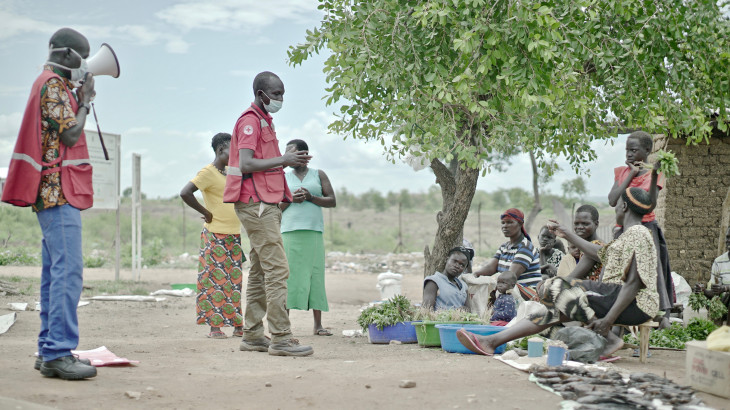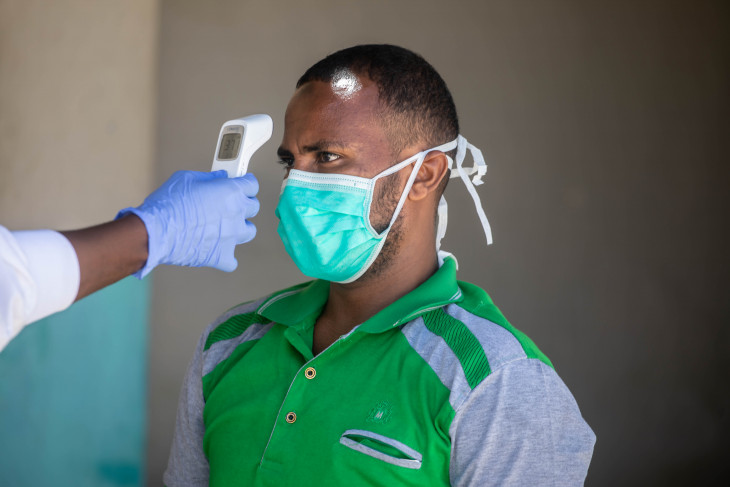COVID-19: Fight far from over as virus accelerates in Africa

"It took Africa nearly five months to hit 500,000 COVID-19 cases, but about a month to double that number. Most of these cases are in South Africa, but around the continent we are seeing the virus spread beyond capital cities and into new areas. If measures against the virus are not followed, we fear that health care systems already weakened by conflict and violence could be overwhelmed by COVID-19." – Patrick Youssef, ICRC's regional director for Africa.
At the same time, fighting has not stopped around the continent, and climate change continues to destroy livelihoods and drive people from their homes. The ICRC's message is clear: its work to serve people affected by armed conflict and violence in Africa will not grind to a halt because of COVID-19. More than 40 per cent of the ICRC's operations are in Africa. Many of these programmes are life-saving and in places where few other organizations have access.
All delegations in Africa have reoriented their plans to face the challenges ahead, both in terms of adapting existing programmes to respond to the shifting needs COVID-19 creates and developing new programmes to tackle COVID-19 head-on.
Creativity, tireless efforts and lots of willingness have helped us adapt our work to the #COVID19 reality.
— ICRC Africa (@ICRC_Africa) July 25, 2020
This is how we ensure our humanitarian action in Africa reaches those in need despite the challenges imposed by the pandemic. pic.twitter.com/WTlJ1PlfHe
Supporting health systems
Many areas in Africa lack even basic health care infrastructure, let alone intensive care capacity. Despite considerable efforts taken already, the virus could take hold in some of the world's most vulnerable communities, with devastating consequences. The ICRC supports health care facilities across the region to help them remain operational and cope with the additional needs that COVID-19 brings.

A patient being screened at Keysaney hospital in Mogadishu, Somalia, as part of COVID-19 preparedness
This includes providing personal protective equipment (PPE), thermometers, and hygiene and cleaning items to hospitals and clinics in countries such as Burundi, Central African Republic (CAR), Democratic Republic of the Congo (DRC), Libya, Mali, Mozambique, Nigeria, Somalia, and South Sudan. Quarantine and disinfection facilities have been built in CAR, DRC, and Mali, and a triage tent was set up at a hospital in Nigeria. In CAR, DRC, Eritrea, and Ethiopia, ambulances have been donated to medical evacuation services. The ICRC is also helping create a COVID-19 treatment centre in northern Mozambique.
In Nigeria, Ethiopia, and Sudan, the ICRC's physical rehabilitation teams – whose job it is to make mobility devices like prosthetics for people suffering from disabilities – have used those skills to make face-shields for medical workers.
COVID-19 means patients can't visit our physical rehabilitation centres in Nigeria.
— ICRC (@ICRC) June 25, 2020
So we've (temporarily) switched from making prosthesis to making PPE. pic.twitter.com/9RjWYaWkUT
Displacement camps
Tens of millions of people are displaced from their homes across Africa because of conflict, violence, and climate shocks. Many of them are living in overcrowded displacement camps, often with poor access to health care, clean water and sanitation, are particularly vulnerable to COVID-19. For them, physical distancing is not an option.
The ICRC is helping displaced people be able to wash their hands and practice good hygiene, by repairing water infrastructure in the DRC, Mali, Mauritania, Nigeria, and South Sudan. In addition, the ICRC is building handwashing stations and providing soap and hygiene items in displacement camps.
Staying at home often means going without any money to buy food and other basics, while going out means being possibly exposed to the virus.
- Ursula Kayali, ICRC economic security coordinator in Pemba, Mozambique
Keeping families in touch
While most of the world has been physically separated from family members during the pandemic, contact by phone and other means has allowed families to stay connected. This is not the case for tens of thousands of people across Africa, who without some support to trace their family members or to place calls or write letters to them, would have no means to keep in touch.
The ICRC, together with national society partners, have been focusing on keeping family links for vulnerable groups such as migrants, detainees, and internally displaced people as well as those in isolation, quarantine and medical facilities.
Losing contact with your family members is a terrible experience. This is what we are doing to tackle this risk during the pandemic #COVID19. pic.twitter.com/03WivCENor
— ICRC Africa (@ICRC_Africa) August 1, 2020
Preventing the spread of COVID-19 in prisons
There are more than 1.1 million detainees in Africa. Many detention facilities are extremely overcrowded, making physical distancing impossible and creating fertile ground for COVID-19 to quickly spread unless infection prevention measures are taken. We are working across the region to put measures in place to prevent the spread of disease inside of places of detention and detect cases early on.
The ICRC's teams across Africa are providing prisons and detention facilities with soap, handwashing stations, chlorine, PPE, and other supplies. They are also helping set up infection prevention control measures at prison entrances and working with authorities to create COVID-19 case management plans.
Strengthening COVID-19 death preparedness plans
While there so far have been relatively few deaths due to COVID-19 in Africa, the time to prepare for the safe and dignified management of the dead is now. COVID-19 deaths need to be handled by trained personnel, who are equipped with personal protective equipment. The dead also need to be treated with dignity and the wishes of families with regards to mourning and burials respected.
It will also be important to document unidentified bodies, so their families one day may be able to have an answer on their loved ones' fate. The ICRC is supporting forensics efforts in several countries by helping assess what capacity is available to deal with COVID-19 deaths, working with authorities to develop or strengthen COVID-19 death preparedness plans, and advising on forensic guidelines and education materials.
Once a country is facing a COVID-19 surge, it is too late to plan for how to manage mass casualties in a way that is both safe for the body handlers and dignified for the families of the deceased. - Stephen Fonseca, ICRC's regional forensics advisor for Africa.
- Stephen Fonseca, ICRC's regional forensics advisor for Africa
Fighting COVID-19 misinformation
Across the continent, the ICRC is working with Red Cross and Red Crescent volunteers to share accurate information on COVID-19 and how people can protect themselves and their families from the disease. This includes radio spots, small group sessions, flyers, posters, tv spots, and targeted information campaigns inside places of detention.
